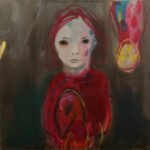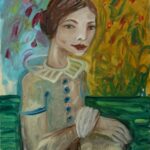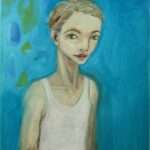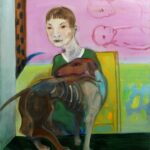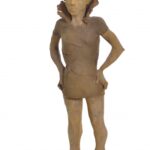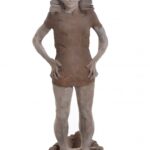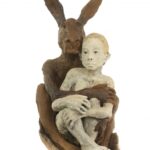
Jusionytė Rūta
Born in 1978 in Klaipėda. Studied at Eduardas Balsis Art Gymnasium, Klaipėda Design Department. In 2001, she graduated from the Vilnius Academy of Arts and went to France to live and work. She now lives and works near Paris. Since 2003, she has been exhibiting her works in France, Switzerland, and Belgium. Her work has been presented in Lithuania for the fourth time since 2014. The artist has held over 30 personal exhibitions and has also participated in about 20 group exhibitions. In November, the artist will be awarded the Georges Coulon Prize of the French Academy of Arts for the best figurative sculpture of 2015 in Paris.
Rūta Jusionytė’s work is full of inner tension, bright, and contrasting. It is full of various themes of human life. The artist thinks about a person at a certain stage of his or her life. This exhibition aims to introduce one of the dominant themes in the artist’s work – the closeness of a girl and a young man, a man and a woman. The author examines a person’s desire to meet another person, their being together, life in a couple. What is important is a person and their relationship with themselves, with another person and with their inner animality. According to the artist, animality is closely connected with a person through the environment around them, through nature, it has survived in human memory from fairy tales and paganism. Her sculptural creatures convey archaic family spirit, metaphorical animality. The characteristics of a person’s character and nature are transferred to an animal, or maybe vice versa – transferred from an animal to a person.
The sculpture depicts a certain inner state of a person, which can be seen or felt when looking at the sculpture. Through that gaze, through the emptiness of the sculpture’s eye, the viewer is allowed to look inside. In painting, a person either sees himself or observes the outside. There is no longer an unlimited field, forest, meadow that he could feel when he was outside, in a forest, in a meadow. He can only use imagination, memory, the known to feel that he is limited in the space of walls. He can know, have seen, been, read, and can imagine. In Rūta Jusionytė’s work, there is a look at others, at the other, through herself as an artist, and, of course, through her fantasy, sensitivity and optimism and a little melancholy.


